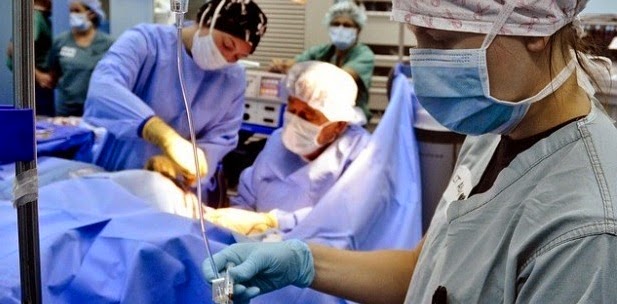The Science, art and practice of Anaesthesiology are changing day by day.The recent advances and researches in the field aim at a faster, safer and smoother recovery from anaesthesia, enabling patients to resume their normal day to day activities early..The elective, day care and office based anaesthesia services have improved so much and the concept of enhanced recovery is widely accepted for practice. Enhanced recovery practices aim fast but smooth recovery following surgery and anaesthesia thereby reducing patient discomfort, length of stay in hospital,prevent loss of manpower and increase productivity.This is achieved not just by cutting short anaesthesia or by providing inadequate or insufficient anaesthesia or by cutting short some surgical procedures but by avoiding certain medications or procedures by surgeons or anaesthetists which may actually delay recovery. It has been clearly shown by studies that enhanced recovery benefits much to colorectal, orthopedic urologic and gynae cological surgeries in terms of early mobilisation, reduction of complications and quality of life.
The single intervention or individual components of a certain surgical procedure, when implemented together as a group have a greater impact on the overall outcome of that procedure.This is the fundamental theory or concept behind enhanced recovery programmes.Even though the concept aims better and early post operative rehabilitation it gives utmost care to preoperative and intra operative assessment and care to make the morbidity less and to provide the highest possible quality of care to patients undergoing surgical procedures.
The Components of Enhanced Recovery Programme.
1. Referral from a general practitioner to specialist
2.Pre operative optimization by Anaesthetists, Physician, and Surgeon.
1.http://www.frca.co.uk/Documents/204%20Enhanced%20recovery%20after%20surgery%20%28ERAS%29.pdf
2.http://www.medscape.org/viewarticle/579805_2
3.http://www.nhsiq.nhs.uk/media/2433399/ijoa_er_editorial_lucas_ijoa_april_2013.pdf
4.http://www.frca.co.uk/Documents/204%20Enhanced%20recovery%20after%20surgery%20%28ERAS%29.pdf
The single intervention or individual components of a certain surgical procedure, when implemented together as a group have a greater impact on the overall outcome of that procedure.This is the fundamental theory or concept behind enhanced recovery programmes.Even though the concept aims better and early post operative rehabilitation it gives utmost care to preoperative and intra operative assessment and care to make the morbidity less and to provide the highest possible quality of care to patients undergoing surgical procedures.
The Components of Enhanced Recovery Programme.
1. Referral from a general practitioner to specialist
- Evaluation of co morbidities like blood sugar and hypertension
- Optimization of hemoglobin level
- Advise to quit smoking
- Advise on limitation of the use of alcoholol
2.Pre operative optimization by Anaesthetists, Physician, and Surgeon.
- Management of Hypertension or Diabetes
- Informed consent and decision making by patient
- Optimization of drug therapy, minimizing the current medications or medication reconciliation
- Advise on postoperative oral intake or mobilization
- Discharge planning should be explained with full instructions given about current medication and stoppage of medication.
- Admission on the day of surgery, Careful planning and advise to patients about preoperative preparation and procedures make it possible for them to get admitted on the day of surgery . The whole documentation including consent must be completed before admission.Preoperative optimization including all necessary investigations and review must be made.
- Avoidance of bowel preparations; Bowel preparation adversely affects normal bowel recovery especially in colorectal surgeries.There is less risk of dehydration in colorectal and urological surgery when oral bowel preparation is not routinely used.It also helps in carbohydrate preloading.
- Avoidance of prolonged fasting; Prolonged starvation adversely affect tissue hydration and serum electrolytes.Minimize fasting time and avoid overnight fasting orders.Fasting time of 2 hours for liquids and 6 hours for solids appropriate.Avoid over hydration too...
- Carbohydrate drinks. Encouraging patients to take carbohydrate drinks (carbohydrate preloading) helps to prevent protein catabolism. It also helps to prevent insulin resistance due to stress response.Carbohydrates provide energy during the fasting period and during surgery and studies have proven that carbohydrate preloading has positive outcomes during recovery and better perioperative control of body metabolism.Use specially formulated oral fluids (complex carbohydrates) that are rapidly emptied from the stomach as they have a relatively low osmolality. CHO loading also helps to reduce patient anxiety, reduces inflammatory response and improve hydration.CHO preloading (drink) may be given 12 hours prior to surgery and up to two hours before reaching the operation suite.For patients with diabetes and delayed gastric emptying necessary precautions may be taken and the second dose may be avoided.
- Avoidance of sedative premedication.Sedative premedications especially long acting sedatives should be avoided as the residual effects can be avoided. To allay anxiety small dose of nonsedating anxiolytics preferred
4.Intra operative care
5.Post operative care
Benefits of enhanced recovery programme
- Always use minimally invasive techniques, especially laparoscopic resection.
- If the abdomen needs to be opened a transverse incision is recommended than longitudinal cuts.This will reduce post operative pain and subsequent use of sedatives or narcotics
- Avoid wound drains if possible. In colonic surgeries drains have been shown to be of no benefit.
- Avoid nasogatric tubes as they increase morbidity in bowel surgeries
- Individualized goal directed fluid therapy helps to avoid over hydration or dehydration. But central lines must be avoided.Fluid administration based on cardiac output monitoring recommended and esophageal doppler will be of great help in this. Judicial use of colloids helps to administer the right minimal amount to keep the cardiac output.
- Anaesthetic care : Use short-acting anaesthetic agents whenever possible.Fentanyl and propofol are chosen for intravenous induction and for maintenance desflurane or sevoflurane may be used.Midazolam may be avoided.Remifentanyl based total intravenous anaesthesia is found to be useful.For abdominal and colorectal surgeries epidural anaesthesia is preferred.They are also helpful to reduce stress response to surgery or may be beneficial to combine with General anaesthesia to reduce the dose of intravenous or inhalational agents.Epidurals also help to prevent post operative paralytic ileus by blocking sympathetic discharge.Excellent post op analgesia by epidural LAs without sedative effects helps early mobilisation or ambulation of post operative patients.Intraoperative use of ondansetron, droperidol or dexamethasone help to prevent PONV during emergence or in the post op period.Risk stratification of PONV using apfel scoring system and aggressive prophylaxis and treatment of PONV are recommended.Hypothermia may prolong recovery so intra operative warming devices and warm fluids must be used.Transverse abdominal plane block or TAP block is also an excellent choice for post operative pain relief especially in laparoscopic surgeries.Avoid the use of drains and nasogastric tubes as nasogastric tubes delay gastric emptying and may trigger nausea and vomiting. Nasogastric tubes and drains can affect a patient’s ability to mobilise as they always create a psychological barrier for early mobilisation attempts. Drains should be avoided If NGT is essential it may be removed immediately at the end of surgery.Even though early mobilisation reduces the risk of DVT, Thromboprophylaxis is recommended in selected cases especially limb surgeries.
5.Post operative care
- Active planned mobilization should be initiated within 24 hours.IV lines and catheters must be removed early.Patients must be encouraged to start early oral feeding which will prevent dehydration and reduce the chances of post op ileus.Also it is proven that early feeding helps to prevent surgical wound infections.Post operative hyperglycemia must be avoided in diabetic patients.Epidural catheters may be removed early after administration of parenteral NSAIDS.For moderate to severe pain oral opioid analgesics may also be supplemented along with NSAIDS.Physiotherapists have an active role in early patient mobilization.Regular follow up should should be done and the follow up process should extend to the post discharge period also. This is achieved by a dedicated clinical staff who can communicate to the patient over telephone who will be informing the clinician about the status of recovery. Discharge is planned as per protocols and criteria.
Benefits of enhanced recovery programme
- In UK, the process is active and an ENHANCED RECOVERY PARTNERSHIP PROGRAMME (ERPP) has been formed with participation of department of health, NHS cancer team and the Royal colleges.The aim of the programme is to create awareness among Physicians, Surgeons and General public about the advantages and benefits of early recovery thereby improving patient care, improving productivity, reducing morbidity and cost.
- Improved clinical outcome and early detection of complications are possible.Earlier return to work or social activity improves productivity and social well being.Reduced hospital stay reduces cost and hospital acquired infections.Reduced waiting time for surgery as the patients are prepared early for surgery.Early mobilization helps to prevent bowel dysfunction and DVT.
- Finally, there are improved relationsh ips between primary care and hospital trusts and better
Since a multidisciplinary team is involved in patient management improved communication and exchange of ideas improve patient care.Overall improvement in patient care and quality makes the process a nice experience for patient and health care team making enhanced recovery an enchanting experience.
1.http://www.frca.co.uk/Documents/204%20Enhanced%20recovery%20after%20surgery%20%28ERAS%29.pdf
2.http://www.medscape.org/viewarticle/579805_2
3.http://www.nhsiq.nhs.uk/media/2433399/ijoa_er_editorial_lucas_ijoa_april_2013.pdf
4.http://www.frca.co.uk/Documents/204%20Enhanced%20recovery%20after%20surgery%20%28ERAS%29.pdf





.jpg)



















No comments:
Post a Comment